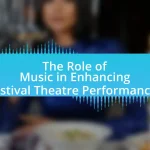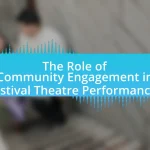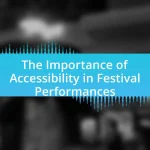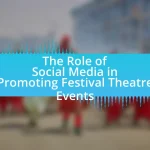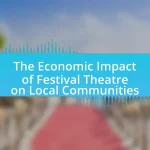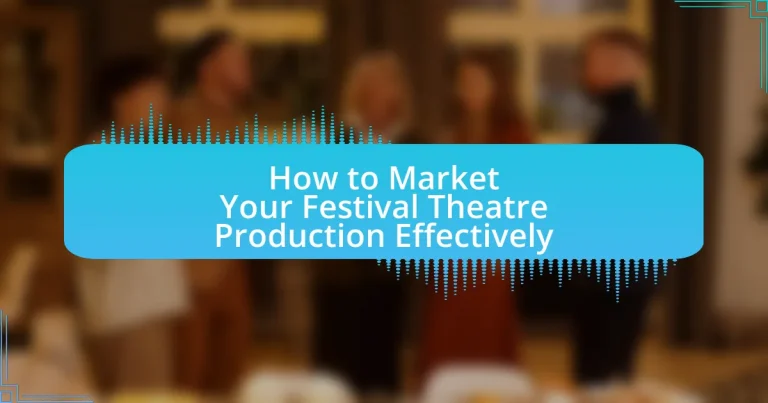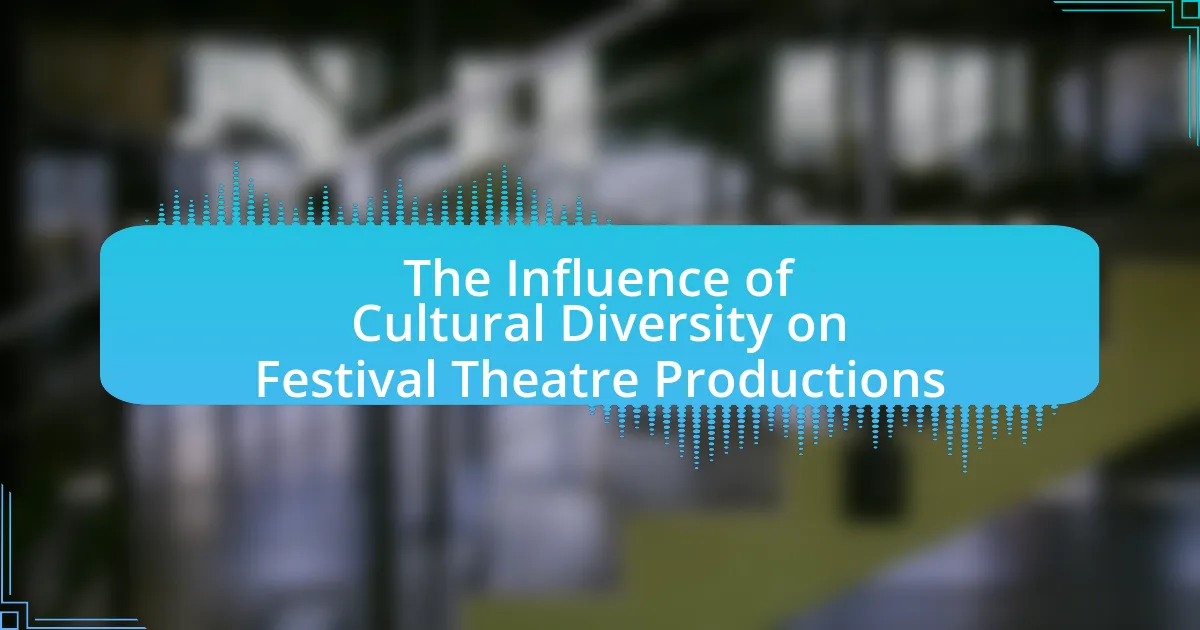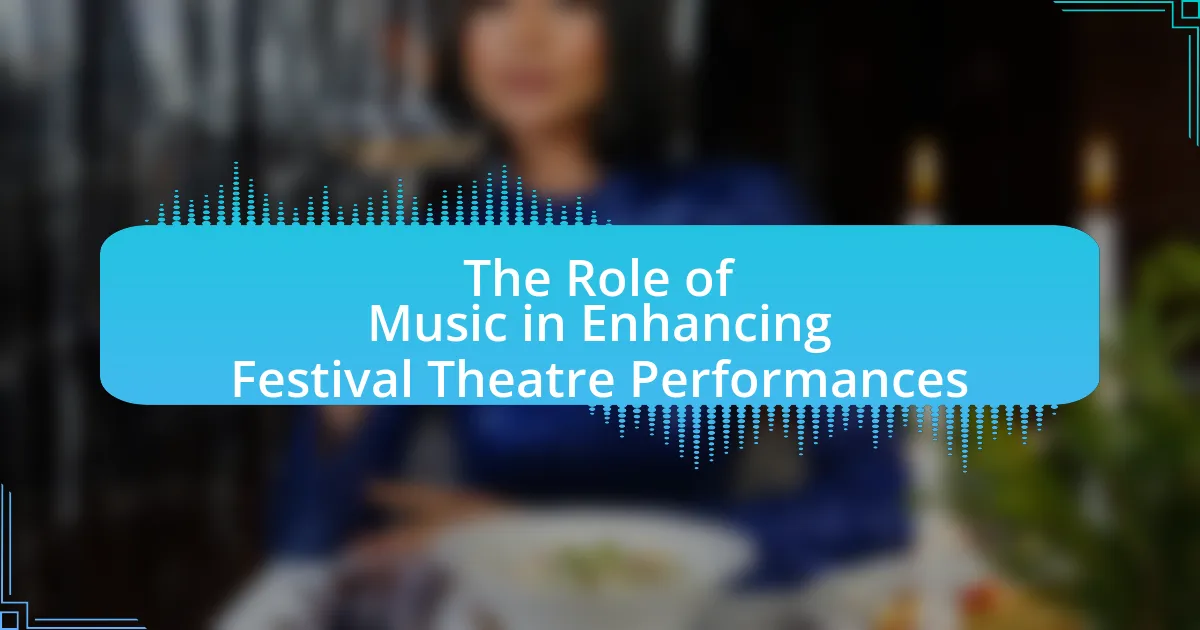The article focuses on effective marketing strategies for festival theatre productions, emphasizing the importance of leveraging social media, engaging local communities, and utilizing targeted advertising to enhance audience reach and ticket sales. It outlines methods for identifying target audiences through demographic analysis and audience feedback, while also discussing the significance of branding and consistency across marketing channels. Additionally, the article highlights the role of engaging content, partnerships, and traditional marketing methods in promoting productions, as well as best practices for measuring marketing success and overcoming common challenges in the industry.

What are the key strategies for marketing your festival theatre production effectively?
The key strategies for marketing your festival theatre production effectively include leveraging social media, engaging with local communities, and utilizing targeted advertising. Social media platforms like Facebook and Instagram allow for direct interaction with potential audiences, enabling promotions and event updates to reach a wider audience. Engaging with local communities through partnerships with schools, businesses, and cultural organizations fosters a sense of ownership and support for the production. Targeted advertising, particularly through online platforms, ensures that marketing efforts reach demographics most likely to attend, increasing ticket sales and audience engagement. These strategies are supported by data indicating that social media marketing can increase event attendance by up to 30%, and community partnerships often lead to higher local engagement and ticket sales.
How can you identify your target audience for the production?
To identify your target audience for the production, conduct thorough market research that includes demographic analysis, audience surveys, and social media insights. This approach allows you to gather data on age, gender, interests, and preferences of potential attendees. For instance, a study by the National Endowment for the Arts found that understanding audience demographics can increase engagement by tailoring marketing strategies to specific groups. By analyzing ticket sales data and audience feedback, you can refine your understanding of who is most likely to attend your production, ensuring that your marketing efforts are effectively directed.
What demographic factors should you consider when defining your audience?
When defining your audience for a festival theatre production, consider demographic factors such as age, gender, income level, education, and geographic location. Age influences preferences for content and style; for instance, younger audiences may prefer contemporary themes, while older audiences might favor classic works. Gender can affect marketing strategies and messaging, as different genders may respond to various themes and promotional tactics. Income level is crucial, as it determines ticket pricing strategies and the types of productions that may attract different economic groups. Education level can influence the audience’s appreciation for certain genres or styles, with more educated audiences potentially favoring complex narratives. Geographic location is essential for understanding cultural preferences and accessibility, as local audiences may have different tastes compared to those from other regions. These factors collectively help tailor marketing efforts to effectively reach and engage the intended audience.
How can audience preferences influence your marketing approach?
Audience preferences significantly influence marketing approaches by guiding the selection of messaging, channels, and promotional strategies. Understanding what resonates with the target audience allows marketers to tailor their campaigns to align with audience interests and behaviors. For instance, data from a 2021 survey by Statista indicated that 70% of consumers prefer personalized marketing messages, demonstrating the effectiveness of aligning marketing strategies with audience preferences. By analyzing audience demographics, psychographics, and feedback, marketers can create compelling content that engages potential attendees, ultimately leading to higher ticket sales and increased attendance at festival theatre productions.
What role does branding play in marketing your production?
Branding plays a crucial role in marketing your production by establishing a unique identity that resonates with your target audience. A strong brand differentiates your production from competitors, creating recognition and loyalty among potential attendees. For instance, a well-defined brand can increase ticket sales by up to 20%, as evidenced by studies showing that consumers are more likely to engage with productions that have a clear and appealing brand identity. This identity encompasses visual elements, messaging, and overall experience, which collectively influence audience perception and engagement.
How can you create a compelling brand identity for your theatre production?
To create a compelling brand identity for your theatre production, you should define a unique vision and mission that resonates with your target audience. This involves developing a distinct visual style, including a logo, color palette, and typography that reflect the themes and emotions of your production. Additionally, crafting a consistent voice and messaging across all marketing materials, such as social media, posters, and press releases, reinforces your brand identity. Research shows that 70% of consumers identify with brands that share their values, highlighting the importance of aligning your brand identity with the audience’s expectations and preferences.
Why is consistency in branding important across marketing channels?
Consistency in branding across marketing channels is crucial because it builds recognition and trust among audiences. When a brand presents a unified message and visual identity, it enhances customer recall and fosters a sense of reliability. Research indicates that consistent branding can increase revenue by up to 23%, as consumers are more likely to engage with brands they recognize and trust. This uniformity across various platforms, such as social media, websites, and print materials, ensures that the audience receives the same experience, reinforcing brand loyalty and encouraging repeat engagement.
What are the most effective marketing channels for festival theatre productions?
The most effective marketing channels for festival theatre productions include social media platforms, email marketing, and partnerships with local businesses. Social media, particularly Facebook and Instagram, allows for targeted advertising and audience engagement, with 73% of marketers believing that their efforts through social media marketing have been “somewhat effective” or “very effective” in promoting events. Email marketing enables direct communication with potential attendees, boasting an average return on investment of $42 for every dollar spent. Collaborating with local businesses can enhance visibility and attract a wider audience, as these partnerships often leverage existing customer bases.
How can social media be utilized to promote your production?
Social media can be utilized to promote your production by creating engaging content that highlights key aspects of the production, such as behind-the-scenes footage, cast interviews, and promotional graphics. This approach fosters audience interest and encourages sharing, which can significantly increase visibility. For instance, a study by the Pew Research Center found that 69% of adults in the U.S. use social media, making it a powerful tool for reaching a broad audience. Additionally, targeted advertising on platforms like Facebook and Instagram allows for precise demographic targeting, ensuring that promotional efforts reach potential attendees effectively.
What traditional marketing methods should you consider?
Traditional marketing methods to consider include print advertising, direct mail, public relations, and event sponsorship. Print advertising, such as flyers and posters, effectively reaches local audiences, while direct mail campaigns can target specific demographics with personalized offers. Public relations efforts, including press releases and media outreach, can generate buzz and attract media coverage, enhancing visibility. Event sponsorship allows for brand association with community events, increasing exposure and credibility. These methods have been proven effective in reaching diverse audiences and driving attendance in various cultural events, including theatre productions.

How can you create engaging content for your marketing efforts?
To create engaging content for your marketing efforts, focus on understanding your audience’s interests and preferences. Tailoring content to resonate with your target demographic increases engagement; for instance, using storytelling techniques can evoke emotions and create a connection. Research shows that content with a narrative structure is 22 times more memorable than facts alone, highlighting the effectiveness of storytelling in marketing. Additionally, incorporating visuals such as images and videos can enhance engagement, as studies indicate that content with relevant visuals receives 94% more views. By combining audience insights with compelling narratives and visuals, you can significantly enhance the engagement of your marketing content.
What types of content resonate most with potential audiences?
Engaging and visually appealing content types resonate most with potential audiences, particularly video content, behind-the-scenes footage, and interactive social media posts. Research indicates that video content generates 1200% more shares than text and images combined, highlighting its effectiveness in capturing audience attention. Additionally, behind-the-scenes footage fosters a sense of connection and authenticity, making audiences feel more involved in the production process. Interactive social media posts, such as polls and quizzes, encourage audience participation, further enhancing engagement and interest in the festival theatre production.
How can behind-the-scenes content enhance audience engagement?
Behind-the-scenes content enhances audience engagement by providing a deeper connection to the production process and the people involved. This type of content allows audiences to see the effort, creativity, and challenges that go into creating a festival theatre production, fostering a sense of authenticity and relatability. Research indicates that 86% of consumers prefer an authentic and honest brand personality, which behind-the-scenes content effectively delivers. By showcasing rehearsals, interviews with cast and crew, and the creative decision-making process, audiences feel more invested in the production, leading to increased interest and attendance.
What role do testimonials and reviews play in your marketing strategy?
Testimonials and reviews are critical components of a marketing strategy as they build trust and credibility with potential audiences. By showcasing positive experiences from previous attendees, festival theatre productions can influence the decision-making process of new customers. Research indicates that 79% of consumers trust online reviews as much as personal recommendations, highlighting the significant impact testimonials have on consumer behavior. Furthermore, incorporating authentic testimonials into marketing materials can enhance engagement and conversion rates, ultimately leading to increased ticket sales and audience attendance.
How can you leverage partnerships and collaborations in your marketing?
You can leverage partnerships and collaborations in your marketing by aligning with organizations that share similar audiences or values, which enhances reach and credibility. For example, partnering with local businesses or cultural institutions can provide mutual promotional opportunities, such as cross-marketing campaigns or co-hosted events, that attract diverse audiences. Research indicates that 70% of marketers believe partnerships can significantly enhance brand visibility and engagement, demonstrating the effectiveness of collaborative marketing strategies.
What types of organizations should you consider partnering with?
Consider partnering with local arts organizations, educational institutions, and community groups. Local arts organizations can provide access to a dedicated audience and resources for promotion, while educational institutions can facilitate workshops and outreach programs that engage students and families. Community groups often have established networks that can enhance visibility and participation in your festival theatre production. Collaborating with these types of organizations can lead to increased attendance and community support, as evidenced by successful partnerships in various cultural festivals that have reported higher engagement levels through such collaborations.
How can cross-promotions benefit your marketing efforts?
Cross-promotions can significantly enhance your marketing efforts by expanding your audience reach and increasing brand visibility. When two or more businesses collaborate to promote each other’s products or services, they leverage each other’s customer bases, which can lead to higher engagement and sales. For instance, a study by the American Marketing Association found that cross-promotional campaigns can increase sales by up to 20% compared to traditional marketing methods. This collaborative approach not only reduces marketing costs but also fosters a sense of community and shared value among participating brands, making it an effective strategy for marketing festival theatre productions.
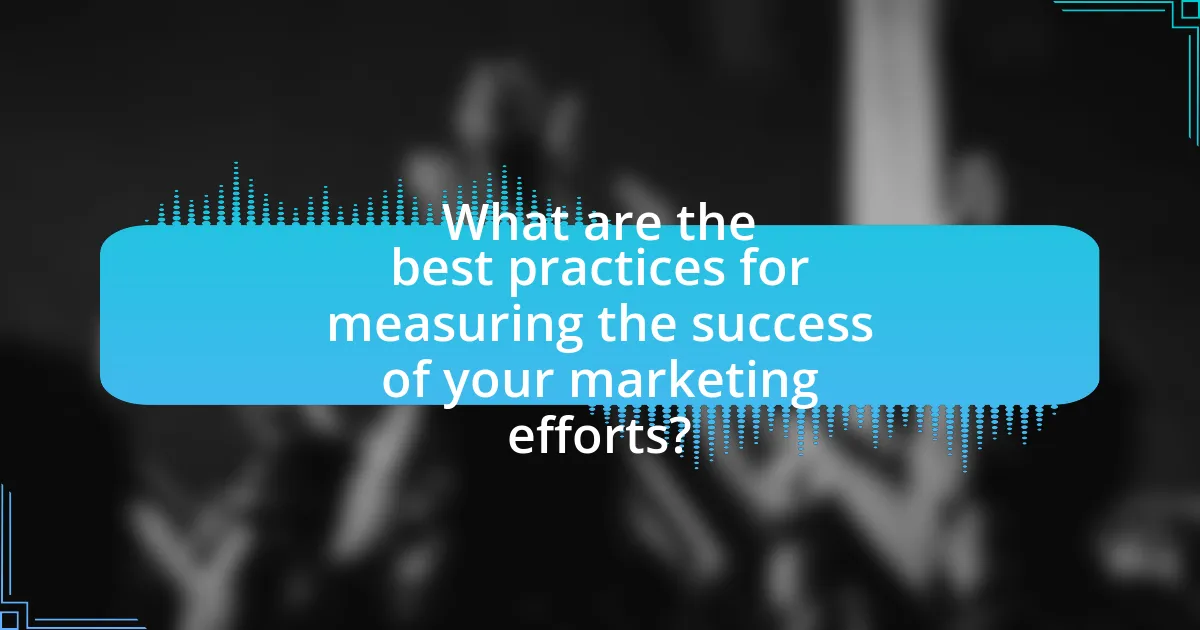
What are the best practices for measuring the success of your marketing efforts?
The best practices for measuring the success of your marketing efforts include setting clear, measurable goals, utilizing key performance indicators (KPIs), and analyzing data from various channels. Establishing specific objectives, such as increasing ticket sales by 20% or growing social media engagement by 30%, allows for targeted measurement. KPIs like conversion rates, return on investment (ROI), and audience reach provide quantifiable metrics to assess performance. Additionally, tools like Google Analytics and social media insights enable marketers to track user behavior and engagement, offering concrete data to evaluate the effectiveness of campaigns. According to a report by HubSpot, companies that regularly analyze their marketing performance are 12 times more likely to achieve a positive ROI, underscoring the importance of these practices.
How can you track the effectiveness of your marketing campaigns?
To track the effectiveness of your marketing campaigns, utilize key performance indicators (KPIs) such as conversion rates, return on investment (ROI), and customer engagement metrics. These KPIs provide measurable data that reflects how well your marketing efforts are achieving their goals. For instance, a study by HubSpot found that businesses that track their marketing performance are 12 times more likely to see a positive ROI. Additionally, tools like Google Analytics can help monitor website traffic and user behavior, offering insights into which campaigns drive the most engagement and conversions.
What metrics should you focus on to evaluate success?
To evaluate success in marketing a festival theatre production, focus on metrics such as ticket sales, audience attendance, social media engagement, and customer feedback. Ticket sales provide direct financial insight, while audience attendance reflects the effectiveness of marketing efforts in attracting viewers. Social media engagement, measured through likes, shares, and comments, indicates the reach and resonance of promotional content. Customer feedback, gathered through surveys or reviews, offers qualitative insights into audience satisfaction and areas for improvement. These metrics collectively provide a comprehensive view of the marketing campaign’s success.
How can audience feedback inform future marketing strategies?
Audience feedback can significantly inform future marketing strategies by providing insights into audience preferences and behaviors. Analyzing feedback allows marketers to identify which aspects of a production resonate most with attendees, enabling them to tailor future campaigns accordingly. For instance, a study by the American Marketing Association found that 70% of consumers are more likely to engage with brands that actively seek and respond to feedback. This data underscores the importance of integrating audience insights into marketing plans to enhance engagement and drive ticket sales.
What common challenges might you face in marketing your production?
Common challenges in marketing a production include limited budget, audience engagement, and competition. Limited budget restricts advertising options and outreach efforts, making it difficult to reach potential attendees effectively. Audience engagement is crucial; without it, even well-funded campaigns may fail to attract interest. Competition from other events or productions can dilute attention and resources, necessitating unique strategies to stand out. According to a survey by the Theatre Communications Group, 60% of theatres reported budget constraints as a significant barrier to effective marketing, highlighting the prevalence of these challenges in the industry.
How can budget constraints impact your marketing strategy?
Budget constraints can significantly limit the scope and effectiveness of a marketing strategy. When financial resources are restricted, organizations must prioritize their marketing efforts, often leading to a focus on low-cost channels such as social media and email marketing instead of more expensive options like television or print advertising. According to a survey by the American Marketing Association, 60% of marketers reported that budget limitations directly influenced their choice of marketing tactics, forcing them to adopt more creative and resourceful approaches to reach their target audience. This shift can result in a more targeted and efficient marketing strategy, but it may also restrict the overall reach and impact of promotional activities.
What strategies can help overcome competition in the festival theatre space?
To overcome competition in the festival theatre space, implementing unique programming and audience engagement strategies is essential. Unique programming can include innovative themes, collaborations with local artists, or exclusive performances that differentiate a festival from others. For instance, festivals that incorporate interactive elements or immersive experiences tend to attract larger audiences, as evidenced by the success of festivals like the Edinburgh Festival Fringe, which features diverse and unconventional performances that draw significant attendance. Additionally, leveraging social media for targeted marketing campaigns can enhance visibility and engagement, as platforms like Instagram and Facebook allow for direct interaction with potential attendees, fostering a sense of community and anticipation around the festival.
What practical tips can enhance your marketing strategy for festival theatre productions?
To enhance your marketing strategy for festival theatre productions, focus on targeted audience engagement through social media campaigns. Utilizing platforms like Instagram and Facebook allows for direct interaction with potential attendees, fostering community and excitement around the production. Research indicates that 72% of consumers prefer to engage with brands through social media, highlighting its effectiveness in reaching audiences. Additionally, collaborating with local influencers can amplify your reach, as their established trust with followers can drive ticket sales. Implementing early bird ticket discounts can also create urgency, encouraging early purchases and increasing overall attendance.


